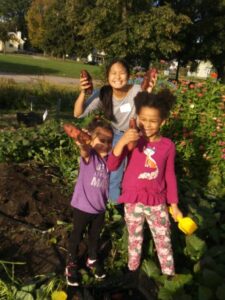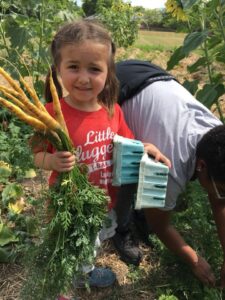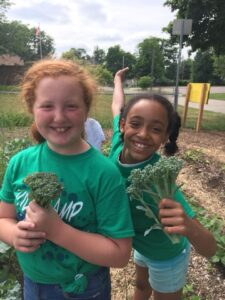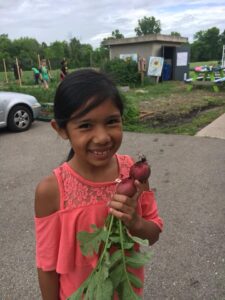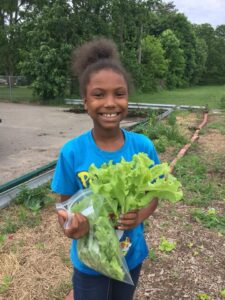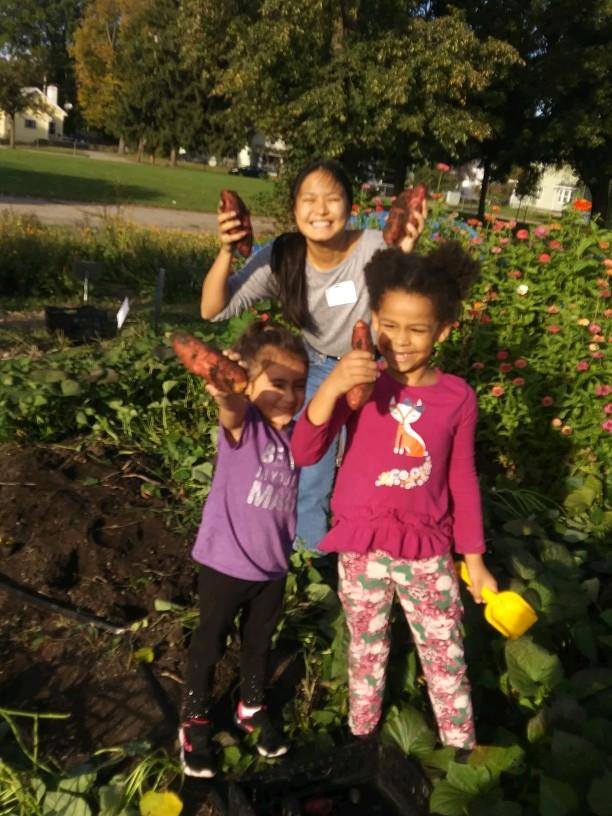Project Overview
Commodities
Practices
- Crop Production: no-till, pollination, pollinator habitat
- Education and Training: demonstration, mentoring, networking, youth education
- Production Systems: holistic management, permaculture
- Soil Management: composting, earthworms, organic matter, soil microbiology, soil quality/health
- Sustainable Communities: community development, community services, leadership development, local and regional food systems, quality of life, social capital, social networks, urban agriculture
Abstract:
Through experiential learning opportunities, we taught youth about many growing practices of sustainable agriculture. These practices included: seeding, transplanting, watering, weeding, pruning, and harvesting. All of the children we work with have been greatly informed about compost and are eager to participate in adding their food scraps to our compost piles. Additionally, we taught youth entrepreneurial skills through the coordination and implementation of a weekly Youth Farm Stand. Youth were able to learn about harvesting and processing produce for sale and the mechanisms of how selling produce works.
The educational approach was a seasonal, place-based exploratory learning. Students are very connected to their school gardens and the rhythms of the garden space. They learn about different growing practices of sustainable agriculture throughout the year as the tasks come up in the garden space. The seasonality of the garden work meant that students explored many different skills and practices over the course of a season.
The grant supported these conclusions: Increased knowledge on how to process/work with that produce, through grilling/communal dinners; stronger relational networks in neighborhood; increased access to fresh vegetables and fruit; and increased sense of ownership of school garden by neighbors and students.
The educational program resulted in many more families harvesting from the garden. Children were harvesting alongside their parents and grandparents. Youth became more comfortable in the space- picking flowers, snacking on veggies and helping with harvests and maintenance. Families also became more comfortable in the space and gained agricultural skills with their children.
We plan and maintain gardens at four elementary schools in Lansing, MI. We use those gardens as settings for our year-round garden-based nutrition education programs. The children we work with are participatory in every stage of our garden season, from beginning to end and become intimately familiar with the practices necessary to grow food. The nutrition component of our work has given us a natural context to highlight the work of local farmers - we’re able to introduce our students to the people whose garlic we buy for fall planting and whose hoophouse greens are used in our winter lessons.
Project objectives:
Objective 1: We will grow, harvest and distribute 200 pounds of food to the students and families who participate in our program.
This objective was accomplished over the course of the summer's garden tour days.
Objective 2: We will support the development and implementation of a student-led garden project at Sheridan Road STEM school that uses sustainable agriculture practices.
This project was planting a pollinator habitat with native plants at the Sheridan Road School Garden. This project included these Sustainable Agriculture practices: Crop/Landscape Diversity and Beneficial Insects.
Objective 3: We will grow our students' knowledge and understanding of many components of local food systems through introductions to 2 farmers and 1 chef.
These interactions took place at our Garden Tour Day events. Students learned about crops the farmers grew and where the chef cooks. Students did not farm with the farmers but did participate in cooking activities with the chefs.
Objective 4: We will continue our outreach efforts and welcome 80 visitors to the gardens during our summer open garden hours events.
The increased tours worked out really well this year. There were 40 people attending the tour weekly by the end of the summer. Students did help lead the tours through the garden.
Other sustainable agricultural practices that the students learned about were: Soil Erosion control- through bed covers for the fall; Soil Quality improvement- by helping spread compost or fish emulsion; Crop/Landscape diversity - about the benefits of lots of diversity in the garden and how that's good for pests; Value-Added and Direct Marketing - through participation in a Youth Farm Stand and selling of lemonade made with garden herbs and berries; Beneficial insects - learning about pollinators in the garden.
The same activities did not occur at all four schools. Garden Tour Days were only at the Riddle Elementary School Garden. The pollinator gardens happened at Sheridan Road STEM and Riddle Elementary. The ages involved were 5 years old through 14 years old. We saw strong interest from the students. Students would show up early to the Garden Tour Days and help harvest produce for the Youth Farm Stand or to give away. They were excited to share their harvest with families and friends. Students connected to the garden through many ways - some helped make lemonade, some were eager to get their hands into the dirt and some just wanted to explore the bugs in the garden.
